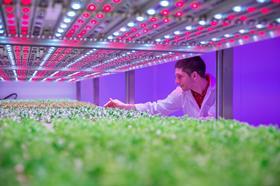
Philips has opened its state-of-the-art GrowWise Center at the High Tech Campus in Eindhoven.
It is hoped that research being conducted by the global lighting giant will provide tailor-made LED light growth recipes, enabling producers to increase their yields and grow healthy food indoors all year round.
The new Netherlands-based 234 sq m facility, one of the world’s largest, will initially concentrate its research on optimising growth recipes for leafy vegetables, strawberries and herbs - on the latter front, it can produce 900 pots of basil per one metre every year.
The grand aim, though, is for the facility to be a scientific testing ground that could potentially fulfil the need of consumers having healthy, locally produced and safe fresh produce available.
Gus van der Feltz, Philips global director of city farming, said: “Our aim is to develop the technology that makes it possible to grow tasty, healthy and sustainable food virtually anywhere. The research we are undertaking will enable local food production on a global scale, reducing waste, limiting food miles and using practically no land or water.
“This new GrowWise City Farming research centre aims to take City Farming to the next level, with Philips scientists leading research into LED light recipes for vegetable and cereal production.”
The research centre is a clean and sterile environment totally closed to natural light and air that enables fully controlled growing conditions. The facility uses connected LED systems that are fully customisable, allowing for the development of ‘growth recipes’ tailored to each crop variety or producers’ requirements. The end result, Philips says, is better tasting products, grown in a more sustainable way and without the need for pesticides.
Van der Feltz added: 'The Philips GrowWise City Farming research centre addresses a number of trends and concerns in society. There is increasing awareness of how the food we eat is grown, the effect it has on our planet and the distance it travels from farm to fork. In addition, it is anticipated that new ways of food production are needed to meet the increasing pressure on worlds’ food supply.'
UN research predicts that by 2050, the world’s population will have grown by another 2.3 billion, and 66 per cent of the world’s population will inhabit cities. Meanwhile, 80 per cent of the world’s agriculture appropriate land is already in use.
Philips' new research facility, which will feature demonstration rooms for customers, is housed at an appropriate location. The High Tech Campus is a technology hub which houses more than 135 companies and some 10,000 researchers, developers and entrepreneurs.
Philips has been active in horticultural lighting since 1936. The business' lighting division had global sales of €6.9 billionin 2014.






No comments yet